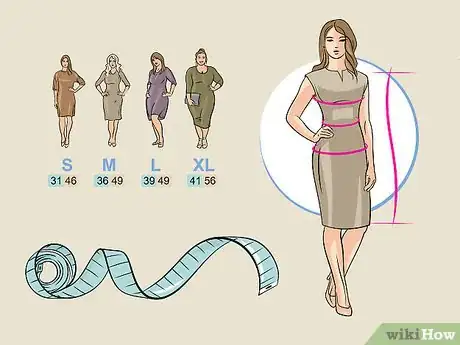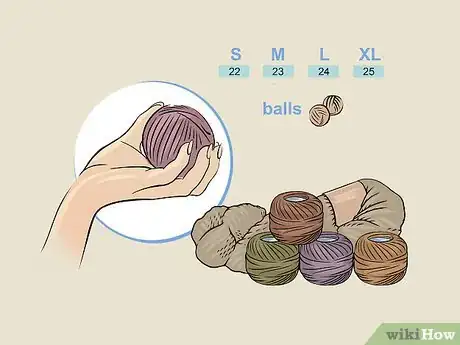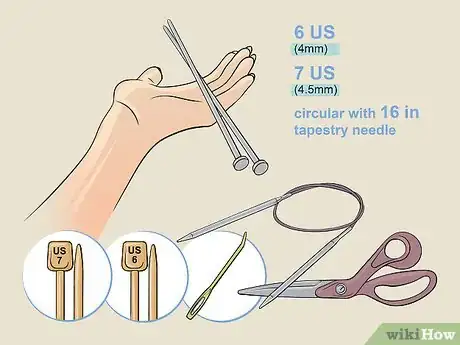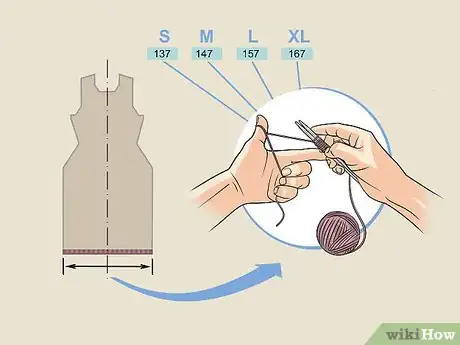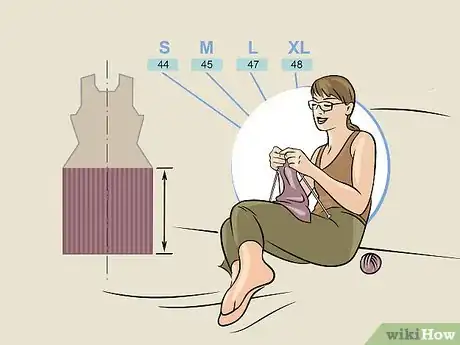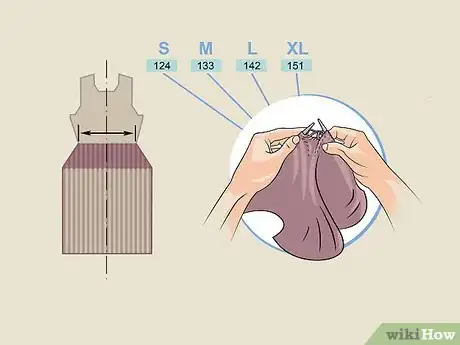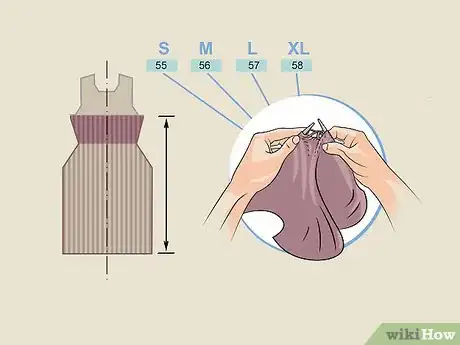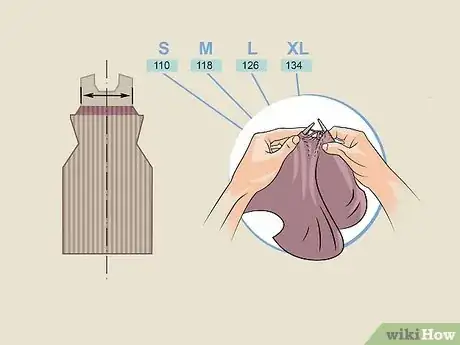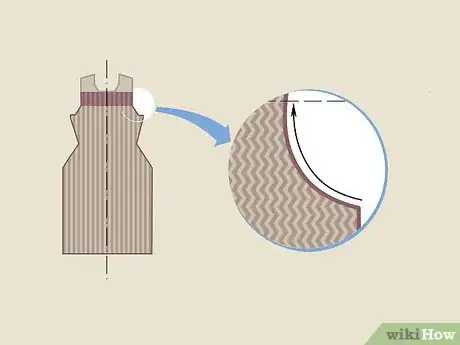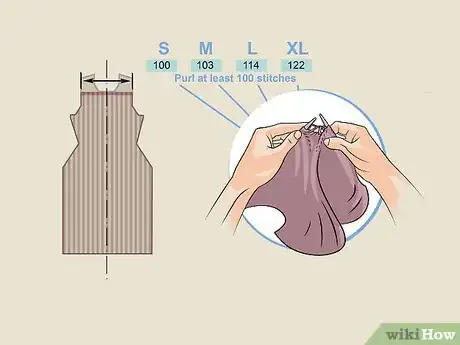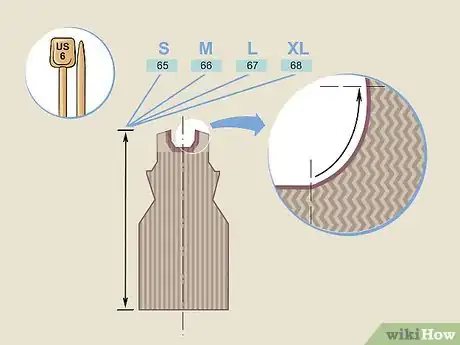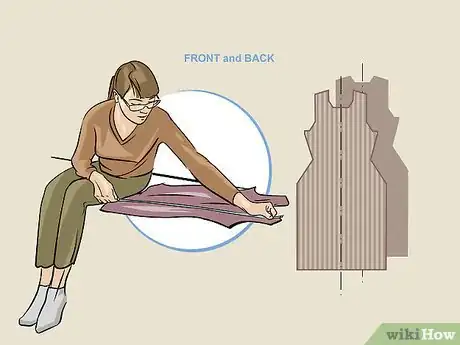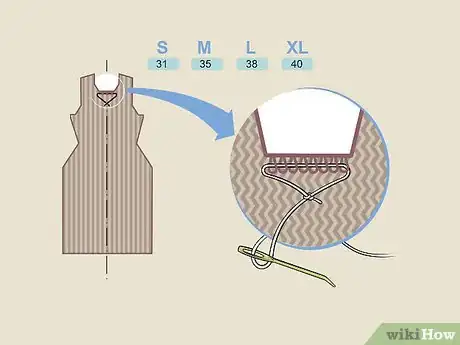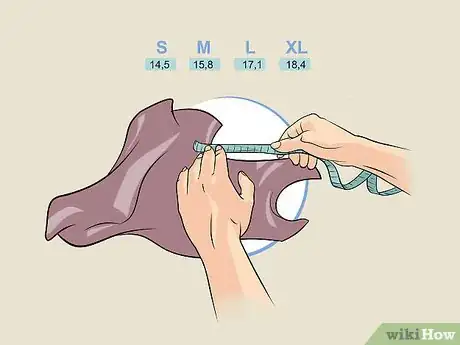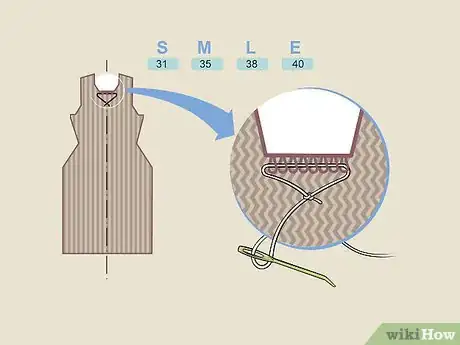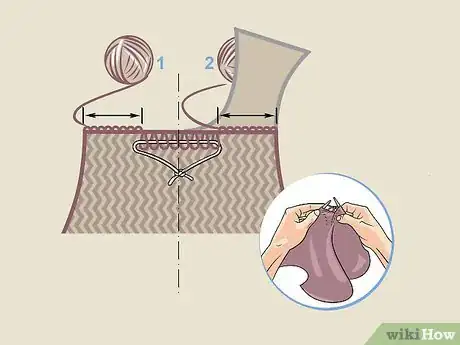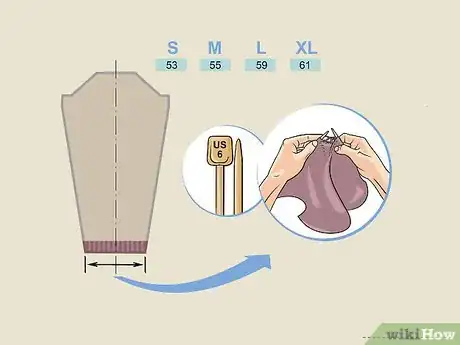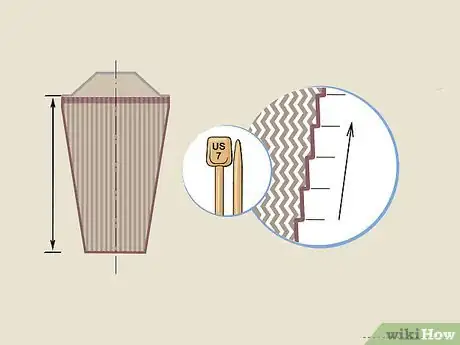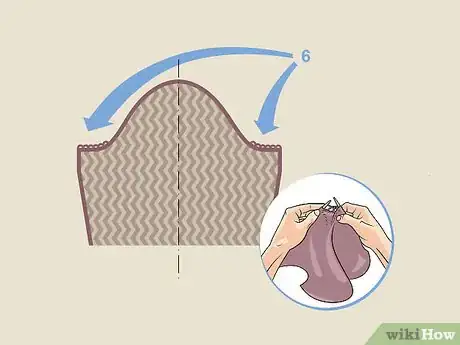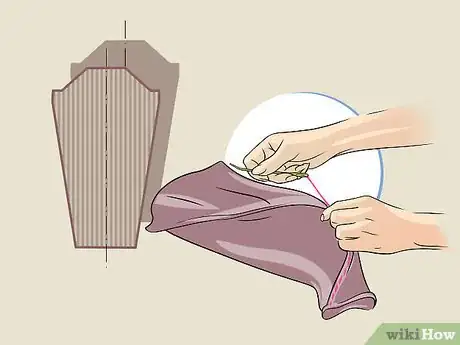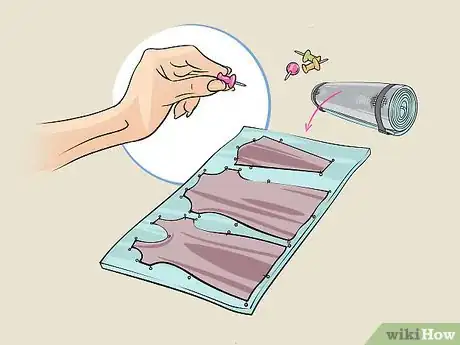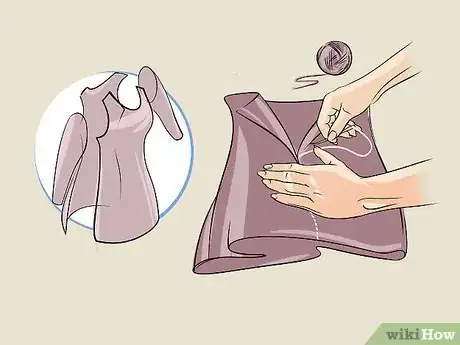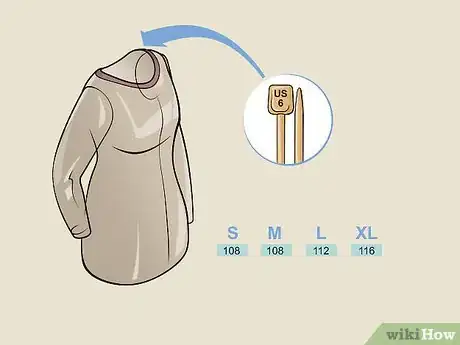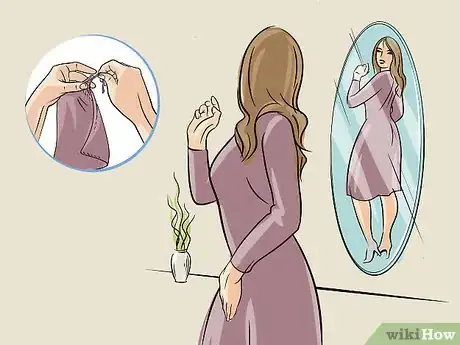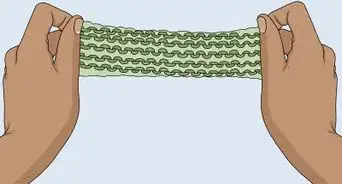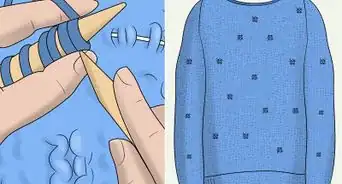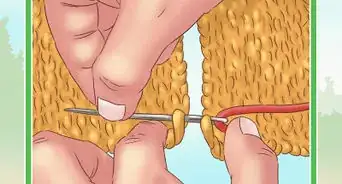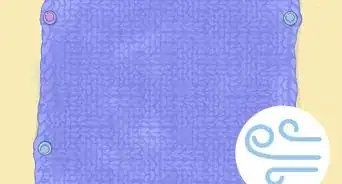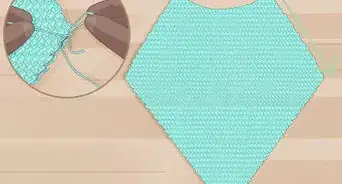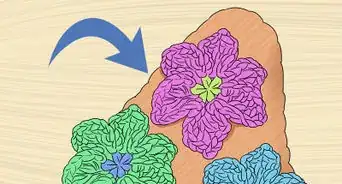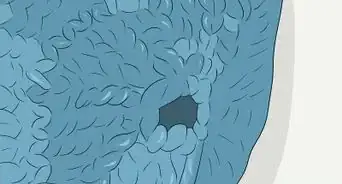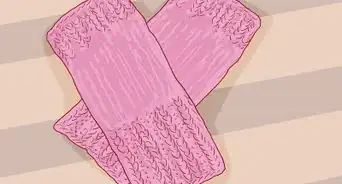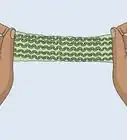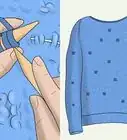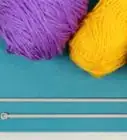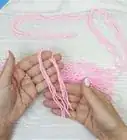This article was co-authored by Jen Webber and by wikiHow staff writer, Jessica Gibson. Jen Webber is a Knitting Specialist and the Manager of The Quarter Stitch, a crafting store based in the French Quarter of New Orleans, Louisiana. With over 17 years of knitting and crafting experience, Jen helps educate customers and the public on best knitting practices for their DIY projects.
This article has been viewed 33,512 times.
If you'd love to branch out with your knitting skills, make a dress. Choose a soft yarn in your favorite color to knit a front piece, back piece, and sleeves. Work the dress in a simple rib pattern and then sew the pieces together. This pattern can make a small, medium, large, or extra-large dress. Just follow the specialized instructions for each size.
Steps
Choosing Your Size and Gathering Materials
-
1Select a size for your dress. You can easily knit an adult-sized dress in small, medium, large, or extra large. While the dress will be 35 in (89 cm) long, you'll need to choose the fitted measurements that most closely match yours:[1]
- Small: bust 34 in (86 cm) and lower edge 46 in (116 cm)
- Medium: bust 36 in (91 cm) and lower edge 49 in (124 cm)
- Large: bust 39 in (99 cm) and lower edge 52 in (132 cm)
- Extra-large: bust 41 in (104 cm) and lower edge 56 in (142 cm)
-
2Buy enough balls of worsted weight yarn in any color. Choose your favorite color and buy balls of yarn that measure 1.75 oz (50 g) and 90 yards (83 m). Depending on what size dress you're knitting, you'll need:[2]
- Small: 22 balls
- Medium: 23 balls
- Large: 24 balls
- Extra-large: 25 balls
Advertisement -
3Gather your knitting needles. Get out size 6 US (4mm) and 7 US (4.5mm) straight knitting needles. You'll also need size 6 US (4mm) circular needles with a 16 in (40 cm) length.
- To weave in the ends, you'll also need a tapestry needle.
Starting the Back Piece
-
1
-
2Knit (k) 3 and purl (p) 2 with selvage stitches for at least 19 in (48 cm). To make a selvage stitch, knit 1. Then k3 and p2 until you reach the last stitch on the row. Knit the last stitch. Keep repeating this until the piece measures:[4]
- Small: 17.5 in (44 cm)
- Medium: 18 in (45 cm
- Large: 18.5 in (47 cm))
- Extra-large: 19 in (48 cm)
-
3
-
4Knit a ribbed stitch for at least 4 in (10 cm). K3, p2, k3, and p1 to make a ribbed stitch. Repeat this stitch until the piece measures:[6]
- Small: 21.5 in (55 cm)
- Medium: 22 in (56 cm)
- Large: 22.5 in (57 cm)
- Extra-large: 23 in (58 cm)
-
5Knit decreasing row 2. Knit 4 stitches and then work a repeating pattern of p2tog, k3, p1, and k3. End the row by p2tog. Then knit 110 stitches for a small (118 for medium, 126 for large, or 134 for extra-large).[7]
-
6Work decreasing row 3. If you're knitting a medium dress, k1 and p1 4 times. If you're knitting an extra-large dress, k1 and p1 only once. Then work a repeating pattern of k1, p2tog, k1, p1 a total of 13 times if you're making a small or medium dress (14 times for a large or 15 for extra-large).[8]
- If you're making a small or large dress, you don't need to start the decreasing row by k1 and p1.
-
7Purl at least 100 stitches. If you're knitting a large, k1, p2tog, and k1 before making the purl stitches. For a small dress, purl 100 stitches (108 for medium, 114 for large, or 122 for extra-large).[9]
-
8Switch to the size 6 US (4mm) needles and work an increasing rib stitch. For the rib stitch, alternate k1 p1 stitches while adding 1 stitch for every 4 rows. Do this 5 times for a small or medium dress or 6 times for a large or extra-large dress. Continue to rib stitch until the front piece measures:[10]
- Small: 25.5 in (65 cm)
- Medium: 26 in (66 cm)
- Large: 26.5 in (67 cm)
- Extra-large: 27 in (68 cm)
Making the Armholes, Neckline, and Front Piece
-
1Bind off and decrease on both sides for the armholes. Once your back piece is as long as you need it, bind off 6 stitches from the start of the next 2 rows. Decrease 1 stitch on each side for every other row. Do this 7 times for a small, medium, or large dress or 8 times for an extra-large dress.[11]
- Continue to work even until the armhole measures 7 in (17 cm) for a small (or 7.5 in for medium, 8 in for large, or 8.5 in for an extra-large).
-
2Shape the back neckline and shoulders of the dress. Bind off 5 stitches for a small dress (6 for a medium or 7 for a large/extra-large) from the beginning of the next 6 rows for a small or medium dress (8 for a large or 4 for an extra-large). Then bind off 6 stitches (7 for medium, none for large, or 8 for extra-large) at the beginning of the next 2 rows for a small or medium dress (none for large or 4 for extra-large).[12]
- Remember to bind off the center 26 stitches for a small or medium dress (28 for large or 30 for extra-large) at the same time.
-
3Work the front piece until the armholes measure at least 5 3/4 in (14.5 cm). Knit the front piece just as you did the back piece. Work until the armholes measure:[13]
- Small: 5 3/4 in (14.5 cm)
- Medium: 6 1/4 in (15.8 cm)
- Large: 6 3/4 in (17.1 cm)
- Extra-large: 7 1/4 (18.4 cm)
-
4Shape the neck on the front piece. Work 31 stitches for a small dress (35 for medium, 38 for large, or 40 for extra-large) and attach another ball of yarn to your working yarn.[14]
-
5Bind off both sides of the neckline using 2 balls of yarn. Bind off the center 22 stitches of the neck for the small or medium dress (24 for large or 26 for extra-large) and work to the end. Then bind off 3 stitches from each edge of the neck pieces. Work both sides at once using the 2 balls of yarn. Keep binding off 2 stitches twice and then decreasing 1 stitch for every other row. Do this 3 times to finish shaping the neckline.[15]
Knitting the Sleeves
-
1Cast stitches onto the small needles and rib stitch for 2 in (5 cm). Use the size 6 US (4mm) needles to cast on 53 stitches for a small dress (55 for medium, 59 for large, or 61 for extra-large). K1 p1 to make a rib stitch.[16]
-
2Use large needles to rib stitch until the sleeve is 17 in (43 cm) long. Change back to the size 7 US (4.5mm) needles and k1 p1 to make a rib stitch. Add 1 stitch to each side for every 4th row. Do this 14 times for a small dress (17 times for a medium and large or 20 times for extra-large). Then make the increasing row every 6th row 7 times for a small dress (5 times for medium and large or 3 times for extra large).[17]
- Continue to work even until the sleeve is 17 in (43 cm) from the beginning.
-
3Bind off stitches to shape the cap. Bind off 6 stitches at the beginning of the next 2 rows and bind off 2 stitches at the beginning of the next 6 rows. Continue to bind off in this order:[18]
- 3 stitches at the beginning of the next 2 rows
- 4 stitches at the beginning of the next 2 rows
- 5 stitches at the beginning of the next 2 rows
- 6 stitches at the beginning of the next 2 rows
-
4Make 1 more sleeve and sew the edges of the sleeves together. Bind off the first sleeve and begin making another sleeve. Thread a tapestry needle and use the mattress stitch to sew the edges of each sleeve together so they both form tubes. Repeat the steps to create another identical sleeve that you can use for the dress.
Finishing the Dress
-
1
-
2Sew the sides and shoulders in place. Remove the knit pieces from the blocking mat and set the shoulder pieces into the armhole spaces. Thread the yarn through the tapestry needle and sew the sides of the dress together. Start near the hemline and sew up towards the armholes using the mattress stitch. Sew around the armholes to secure the sleeves to the dress.
-
3Knit the neckband on the circular needles. Use the size 6 US (4mm) circular needles to pick up 108 stitches for a small dress (108 for medium, 112 for large, or 116 for extra-large). Knit each of the stitches around and join the work. Knit 1 more round.[21]
-
4
Community Q&A
Did you know you can get answers researched by wikiHow Staff?
Unlock staff-researched answers by supporting wikiHow
-
QuestionWhat is the difference between a knit dress and a knitted dress?
 wikiHow Staff EditorThis answer was written by one of our trained team of researchers who validated it for accuracy and comprehensiveness.
wikiHow Staff EditorThis answer was written by one of our trained team of researchers who validated it for accuracy and comprehensiveness.
Staff Answer wikiHow Staff EditorStaff AnswerIt could just be how the person using the terms calls a dress that has been knitted. Or, it could mean that a knit dress has been made from knit fabric, which is a type of fabric that has been machine knitted on a very small scale (too small for a human to do) and that creates a knitted fabric that is soft, supple and stretchy. Sometimes it is called knit jersey fabric. In this case, the dress itself would have been sewn, not knitted by hand. If this is what the person means then, the knit dress is made from fabric, while the knitted dress was knitted from yarn.
wikiHow Staff EditorStaff AnswerIt could just be how the person using the terms calls a dress that has been knitted. Or, it could mean that a knit dress has been made from knit fabric, which is a type of fabric that has been machine knitted on a very small scale (too small for a human to do) and that creates a knitted fabric that is soft, supple and stretchy. Sometimes it is called knit jersey fabric. In this case, the dress itself would have been sewn, not knitted by hand. If this is what the person means then, the knit dress is made from fabric, while the knitted dress was knitted from yarn. -
QuestionIs there another name for a knitted dress?
 wikiHow Staff EditorThis answer was written by one of our trained team of researchers who validated it for accuracy and comprehensiveness.
wikiHow Staff EditorThis answer was written by one of our trained team of researchers who validated it for accuracy and comprehensiveness.
Staff Answer wikiHow Staff EditorStaff Answer
wikiHow Staff EditorStaff Answer -
QuestionCan you wear tights with a knitted dress?
 wikiHow Staff EditorThis answer was written by one of our trained team of researchers who validated it for accuracy and comprehensiveness.
wikiHow Staff EditorThis answer was written by one of our trained team of researchers who validated it for accuracy and comprehensiveness.
Staff Answer wikiHow Staff EditorStaff AnswerYes, you certainly can wear tights with a knitted dress and this is a standard way to make the dress look even better and to keep you warm. It's important to match or contrast the color of the tights with the dress so it doesn't clash or appear overwhelming and be careful with patterned tights if the knitted dress has its own bold pattern. Other options include knee-high socks, leggings, jeggings, exercise/yoga pants and even skinny jeans under a knitted dress.
wikiHow Staff EditorStaff AnswerYes, you certainly can wear tights with a knitted dress and this is a standard way to make the dress look even better and to keep you warm. It's important to match or contrast the color of the tights with the dress so it doesn't clash or appear overwhelming and be careful with patterned tights if the knitted dress has its own bold pattern. Other options include knee-high socks, leggings, jeggings, exercise/yoga pants and even skinny jeans under a knitted dress.
Things You'll Need
- 22 to 25 balls of worsted weight yarn that measure 1.75 oz (50 g) and 90 yards (83 m)
- Size 6 US (4mm) and 7 US (4.5mm) straight knitting needles
- Size 6 US (4mm) circular needles with a 16 in (40 cm) length
- Blocking mat and pins
- Scissors
- Tapestry needle
References
- ↑ http://archive.berroco.com/186/186_anna.html
- ↑ http://archive.berroco.com/shade_cards/sensuwool_sh.html
- ↑ http://archive.berroco.com/186/186_anna.html
- ↑ http://archive.berroco.com/186/186_anna.html
- ↑ http://archive.berroco.com/186/186_anna.html
- ↑ http://archive.berroco.com/186/186_anna.html
- ↑ http://archive.berroco.com/186/186_anna.html
- ↑ http://archive.berroco.com/186/186_anna.html
- ↑ http://archive.berroco.com/186/186_anna.html
- ↑ http://archive.berroco.com/186/186_anna.html
- ↑ http://archive.berroco.com/186/186_anna.html
- ↑ http://archive.berroco.com/186/186_anna.html
- ↑ http://archive.berroco.com/186/186_anna.html
- ↑ http://archive.berroco.com/186/186_anna.html
- ↑ http://archive.berroco.com/186/186_anna.html
- ↑ http://archive.berroco.com/186/186_anna.html
- ↑ http://archive.berroco.com/186/186_anna.html
- ↑ http://archive.berroco.com/186/186_anna.html
- ↑ Jen Webber. Knitting Specialist. Expert Interview. 4 August 2020.
- ↑ http://archive.berroco.com/186/186_anna.html
- ↑ http://archive.berroco.com/186/186_anna.html
- ↑ Jen Webber. Knitting Specialist. Expert Interview. 4 August 2020.
- ↑ http://archive.berroco.com/186/186_anna.html
